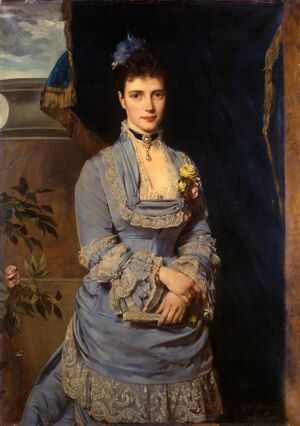Mariya Fyodorovna
Russian Empress ("Tsaritsa"), wife of Alexander III (b. 26 November 1847 [N.S.] in Copenhagen; d. 13 October 1928 in Hvidøre, Denmark), born Princess Marie Sophie Frederikke Dagmar of Denmark; known after her marriage by the Russian forenames Mariya Fyodorovna (Мария Фёдоровна).
Marie was the second daughter of King Christian IX of Denmark (1818–1906) and Queen Louise of Hesse (1817–1898). In 1866, she married the heir to the Russian throne (the Grand Duke Aleksandr Aleksandrovich) and assumed the title of Grand Duchess Mariya Fyodorovna. Tchaikovsky was commissioned to write a Festival Overture on the Danish National Anthem, Op. 15, as part of the wedding festivities, and he also made an orchestral arrangement of Aleksandr Dubuque's Marie-Dagmar Polka, originally written for piano. The composer was rewarded for his efforts with a set of jewelled cuff-links, which he promptly sold on to Dubuque.
When her husband succeeded as Tsar Alexander III in 1881, Mariya became his Empress (Tsaryna). For the coronation celebrations in May 1883, Tchaikovsky was commissioned to write a festival cantata — entitled Moscow — and a Coronation March for orchestra. The latter work contained extracts from the Danish Royal Anthem, in the Empress's honour.
In 1886, Tchaikovsky also wrote his Twelve Romances, Op. 60 in response to a suggestion by the Empress Mariya Fyodorovna, and the whole set is dedicated to her.
After the death of her husband in 1894, Mariya Fyodorovna remained in Russia as Dowager Empress until she was forced to leave the country in 1919 in the aftermath of the Bolshevik revolution.
Dedicatons
In 1886, Tchaikovsky dedicated his set of Twelve Romances, Op. 60 to the Empress.

